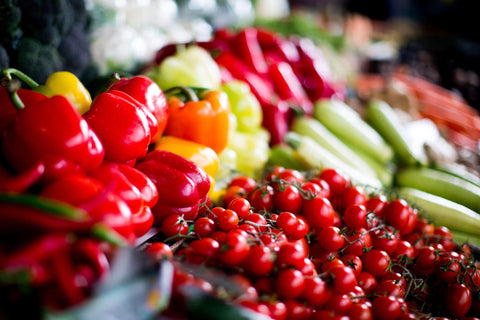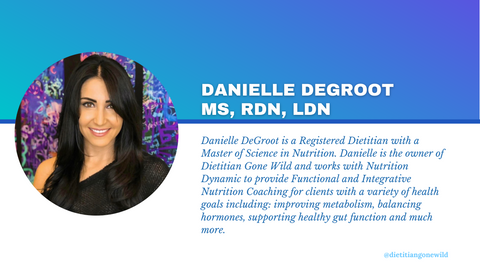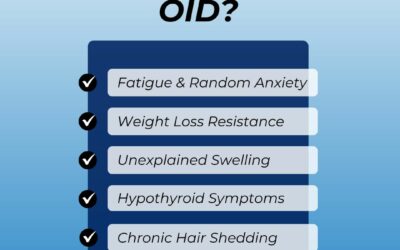by Danielle DeGroot, MS, RDN, LDN – Instagram: @dietitiangonewild
Gut health is all the rage these days and for good reason! At least 70% of our immune system is located in the gut. The gut-brain connection is being studied more and more, even linking poor gut health to autoimmune diseases. Not to mention, the impact the gut has on our mood and it’s relation to depression and anxiety. Here are 10 things to add to your diet to create a happy microbiome!
- FIBER: The daily recommendations are 25-30 grams, but quite honestly.. more is better!At Vidal Coachingwe have many clients eating up to double that amount when we get started to help decrease inflammation and improve digestion.Fiber also provides prebiotics which essentially feed probiotics (we’ll get to those later in the list) and support a healthy microbiome.Fiber can come from fruits, veggies, seeds, legumes and grains. Specific sources of prebitoics include leesk, onioins, garlic, chicory root, seaweed and bananas. Gourmet Greens at Nutrition dynamics is also a great source of prebiotic and you can grab it here: Vidal CoachingProducts
- Greens: Cruciferous and leafy greens have been associated with playing a major role in modulating innate lymphoid cells (ILCs) in the lining of the digestive tract. These cells protect us from harmful bacteria which can lead to food allergies and inflammatory diseases.In addition, the potassium content of greens can help decrease bloating caused by an overabundance of sodium intake from processed foods. That being said, limiting those processed foods in the first place is a great way to support your gut health too!
-
Omega 3’s: Omega 3 Polyunsaturated Fatty Acids can help to lower inflammation in the gut through production of short chain fatty acids, which helps to create a more balanced microbiota. Omega 3’s may also be protective against Leaky Gut by protecting the integrity of the intestinal wall.

- A variety of colorful produce: Eating the rainbow means you’re eating a variety of vitamins and antioxidants. Antioxidants can help reduce inflammation in the gut by protecting the gut epithelial cells from oxidative damage.
- Peppermint Tea: Peppermint has shown to relax the muscles of the digestive system. Several studies have looked at potential benefits of peppermint oil with Irritable Bowel Syndrome and found improvements of symptoms compared to placebo.
- Probiotics: These differ from the prebiotics mentioned before. Prebiotics provide food for probiotics, which are live microorganisms, to grow.Probiotics help create an environment for “good” bacteria in the gut to flourish.However, not all probiotics are created equal. Specific strains and species can be taken for different functions. Additionally, for someone with bacterial overgrowth, adding in probiotics may cause more harm than good until the overgrowth is dealt with. Food sources of probiotics include Kefir, yogurt, kombucha, pickled vegetables and kimchi.
- MCT Oil: Caprylic acid in Medium-Chain Triglyceride Oil can create an environment in the gut that does not allow the “bad” bacteria to grow.
- Bone Broth: The collagen in bone broth contains collagen which can help to strengthen the gut lining, preventing leaky gut and reducing inflammation. Sip on some as a beverage with garlic and ginger added in or add it to a dish!
- ACV: The natural acidity of Apple Cider Vinegar can improve the acidity of the stomach for those with low stomach acid, which is often the cause of acid reflux.Acid in the stomach is crucial for digestion.The antimicrobial benefits of ACV can help kill bad bacteria that may enter the digestive tract. ACV can be tough to swallow so dilute with some water or with aloe vera and lemon juice to ease the sting.
- Aloe Vera Juice or Gel: Soothes the GI tract if taken before meals and aids motility in the gut, helping with elimination in cases of constipation.
While these are great additions for general gut health, if you are dealing with more serious gut complications some of these may not be beneficial for you at this time. To get individualized help improving your gut health, book a Discovery Call with us! If you’d like to work with me as your Coach, mention my name on the call.
Free Discovery Call link: https://calendly.com/healthguide/discovery

References:
Anderson, S. C., Cryan, J. F., & Dinan, T. (2017). The psychobiotic revolution: mood, food, and the new science of the gut-brain connection. National Geographic Books.
Wekerle, H. (2016). The gut–brain connection: triggering of brain autoimmune disease by commensal gut bacteria. Rheumatology, 55(suppl_2), ii68-ii75.
Reichelt, K. L., & Knivsberg, A. M. (2009). The possibility and probability of a gut-to-brain connection in autism. Ann Clin Psychiatry, 21(4), 205-211.
Costantini L, Molinari R, Farinon B, Merendino N. Impact of Omega-3 Fatty Acids on the Gut Microbiota. International Journal of Molecular Sciences. 2017; 18(12):2645. https://doi.org/10.3390/ijms18122645
Miller, M. J., Angeles, F. M., Reuter, B. K., Bobrowski, P., & Sandoval, M. (2001). Dietary antioxidants protect gut epithelial cells from oxidant-induced apoptosis. BMC Complementary and Alternative Medicine, 1(1), 1-10.
Khanna, R., MacDonald, J. K., & Levesque, B. G. (2014). Peppermint oil for the treatment of irritable bowel syndrome: a systematic review and meta-analysis. Journal of clinical gastroenterology, 48(6), 505–512. https://doi.org/10.1097/MCG.0b013e3182a88357
Cash, B. D., Epstein, M. S., & Shah, S. M. (2016). A Novel Delivery System of Peppermint Oil Is an Effective Therapy for Irritable Bowel Syndrome Symptoms. Digestive diseases and sciences, 61(2), 560–571. https://doi.org/10.1007/s10620-015-3858-7
Harrison, L. M., Balan, K. V., & Babu, U. S. (2013). Dietary fatty acids and immune response to food-borne bacterial infections. Nutrients, 5(5), 1801–1822. https://doi.org/10.3390/nu5051801
Yagnik, D., Serafin, V., & J Shah, A. (2018). Antimicrobial activity of apple cider vinegar against Escherichia coli, Staphylococcus aureus and Candida albicans; downregulating cytokine and microbial protein expression. Scientific reports, 8(1), 1732. https://doi.org/10.1038/s41598-017-18618-x
Rajeswari, R., Umadevi, M., Rahale, C. S., Pushpa, R., Selvavenkadesh, S., Kumar, K. S., & Bhowmik, D. (2012). Aloe vera: the miracle plant its medicinal and traditional uses in India. Journal of Pharmacognosy and Phytochemistry, 1(4), 118-124.





